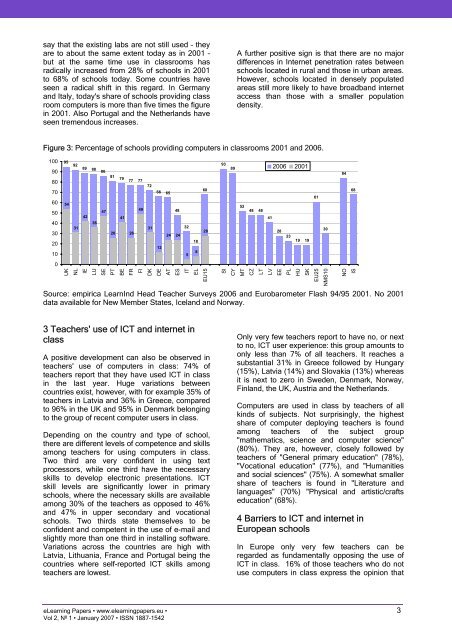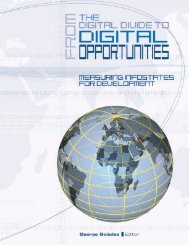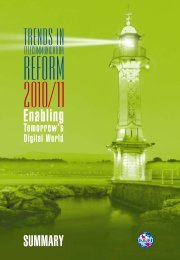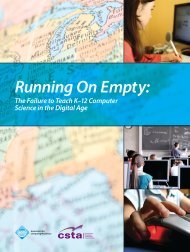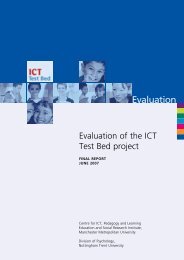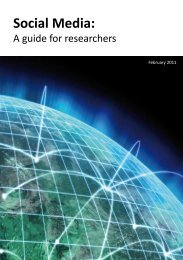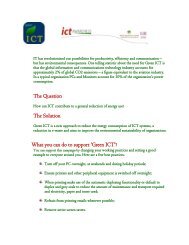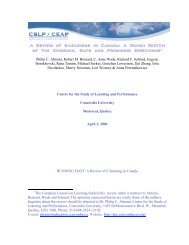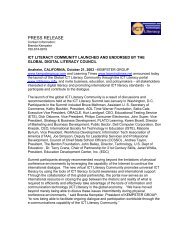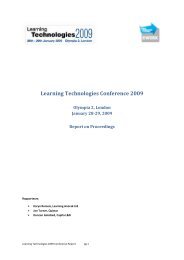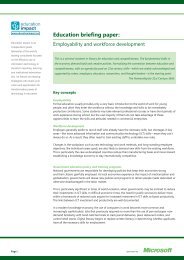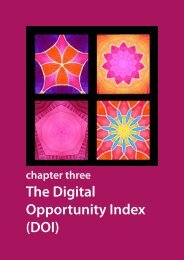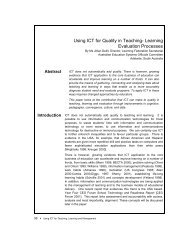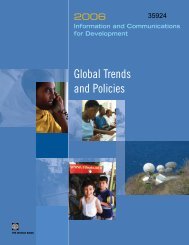Benchmarking Access and Use of ICT in European Schools 2006 ...
Benchmarking Access and Use of ICT in European Schools 2006 ...
Benchmarking Access and Use of ICT in European Schools 2006 ...
Create successful ePaper yourself
Turn your PDF publications into a flip-book with our unique Google optimized e-Paper software.
say that the exist<strong>in</strong>g labs are not still used – they<br />
are to about the same extent today as <strong>in</strong> 2001 –<br />
but at the same time use <strong>in</strong> classrooms has<br />
radically <strong>in</strong>creased from 28% <strong>of</strong> schools <strong>in</strong> 2001<br />
to 68% <strong>of</strong> schools today. Some countries have<br />
seen a radical shift <strong>in</strong> this regard. In Germany<br />
<strong>and</strong> Italy, today's share <strong>of</strong> schools provid<strong>in</strong>g class<br />
room computers is more than five times the figure<br />
<strong>in</strong> 2001. Also Portugal <strong>and</strong> the Netherl<strong>and</strong>s have<br />
seen tremendous <strong>in</strong>creases.<br />
A further positive sign is that there are no major<br />
differences <strong>in</strong> Internet penetration rates between<br />
schools located <strong>in</strong> rural <strong>and</strong> those <strong>in</strong> urban areas.<br />
However, schools located <strong>in</strong> densely populated<br />
areas still more likely to have broadb<strong>and</strong> <strong>in</strong>ternet<br />
access than those with a smaller population<br />
density.<br />
Figure 3: Percentage <strong>of</strong> schools provid<strong>in</strong>g computers <strong>in</strong> classrooms 2001 <strong>and</strong> <strong>2006</strong>.<br />
100<br />
90<br />
80<br />
70<br />
60<br />
50<br />
40<br />
30<br />
20<br />
10<br />
0<br />
95<br />
54<br />
92<br />
31<br />
89 88<br />
42<br />
36<br />
86<br />
47<br />
81<br />
26<br />
79<br />
41<br />
77 77<br />
26<br />
49<br />
72<br />
31<br />
66 65<br />
12<br />
48<br />
24 24<br />
UK<br />
NL<br />
IE<br />
LU<br />
SE<br />
PT<br />
BE<br />
FR<br />
FI<br />
DK<br />
DE<br />
AT<br />
ES<br />
IT<br />
EL<br />
EU15<br />
32<br />
5<br />
18<br />
8<br />
68<br />
28<br />
93<br />
89<br />
52<br />
48 48<br />
41<br />
<strong>2006</strong> 2001<br />
28<br />
23<br />
19 19<br />
SI<br />
CY<br />
MT<br />
CZ<br />
LT<br />
LV<br />
EE<br />
PL<br />
HU<br />
SK<br />
EU25<br />
NMS10<br />
Source: empirica LearnInd Head Teacher Surveys <strong>2006</strong> <strong>and</strong> Eurobarometer Flash 94/95 2001. No 2001<br />
data available for New Member States, Icel<strong>and</strong> <strong>and</strong> Norway.<br />
61<br />
30<br />
84<br />
68<br />
NO<br />
IS<br />
3 Teachers' use <strong>of</strong> <strong>ICT</strong> <strong>and</strong> <strong>in</strong>ternet <strong>in</strong><br />
class<br />
A positive development can also be observed <strong>in</strong><br />
teachers' use <strong>of</strong> computers <strong>in</strong> class: 74% <strong>of</strong><br />
teachers report that they have used <strong>ICT</strong> <strong>in</strong> class<br />
<strong>in</strong> the last year. Huge variations between<br />
countries exist, however, with for example 35% <strong>of</strong><br />
teachers <strong>in</strong> Latvia <strong>and</strong> 36% <strong>in</strong> Greece, compared<br />
to 96% <strong>in</strong> the UK <strong>and</strong> 95% <strong>in</strong> Denmark belong<strong>in</strong>g<br />
to the group <strong>of</strong> recent computer users <strong>in</strong> class.<br />
Depend<strong>in</strong>g on the country <strong>and</strong> type <strong>of</strong> school,<br />
there are different levels <strong>of</strong> competence <strong>and</strong> skills<br />
among teachers for us<strong>in</strong>g computers <strong>in</strong> class.<br />
Two third are very confident <strong>in</strong> us<strong>in</strong>g text<br />
processors, while one third have the necessary<br />
skills to develop electronic presentations. <strong>ICT</strong><br />
skill levels are significantly lower <strong>in</strong> primary<br />
schools, where the necessary skills are available<br />
among 30% <strong>of</strong> the teachers as opposed to 46%<br />
<strong>and</strong> 47% <strong>in</strong> upper secondary <strong>and</strong> vocational<br />
schools. Two thirds state themselves to be<br />
confident <strong>and</strong> competent <strong>in</strong> the use <strong>of</strong> e-mail <strong>and</strong><br />
slightly more than one third <strong>in</strong> <strong>in</strong>stall<strong>in</strong>g s<strong>of</strong>tware.<br />
Variations across the countries are high with<br />
Latvia, Lithuania, France <strong>and</strong> Portugal be<strong>in</strong>g the<br />
countries where self-reported <strong>ICT</strong> skills among<br />
teachers are lowest.<br />
Only very few teachers report to have no, or next<br />
to no, <strong>ICT</strong> user experience: this group amounts to<br />
only less than 7% <strong>of</strong> all teachers. It reaches a<br />
substantial 31% <strong>in</strong> Greece followed by Hungary<br />
(15%), Latvia (14%) <strong>and</strong> Slovakia (13%) whereas<br />
it is next to zero <strong>in</strong> Sweden, Denmark, Norway,<br />
F<strong>in</strong>l<strong>and</strong>, the UK, Austria <strong>and</strong> the Netherl<strong>and</strong>s.<br />
Computers are used <strong>in</strong> class by teachers <strong>of</strong> all<br />
k<strong>in</strong>ds <strong>of</strong> subjects. Not surpris<strong>in</strong>gly, the highest<br />
share <strong>of</strong> computer deploy<strong>in</strong>g teachers is found<br />
among teachers <strong>of</strong> the subject group<br />
"mathematics, science <strong>and</strong> computer science"<br />
(80%). They are, however, closely followed by<br />
teachers <strong>of</strong> "General primary education" (78%),<br />
"Vocational education" (77%), <strong>and</strong> "Humanities<br />
<strong>and</strong> social sciences" (75%). A somewhat smaller<br />
share <strong>of</strong> teachers is found <strong>in</strong> "Literature <strong>and</strong><br />
languages" (70%) "Physical <strong>and</strong> artistic/crafts<br />
education" (68%).<br />
4 Barriers to <strong>ICT</strong> <strong>and</strong> <strong>in</strong>ternet <strong>in</strong><br />
<strong>European</strong> schools<br />
In Europe only very few teachers can be<br />
regarded as fundamentally oppos<strong>in</strong>g the use <strong>of</strong><br />
<strong>ICT</strong> <strong>in</strong> class. 16% <strong>of</strong> those teachers who do not<br />
use computers <strong>in</strong> class express the op<strong>in</strong>ion that<br />
eLearn<strong>in</strong>g Papers • www.elearn<strong>in</strong>gpapers.eu • 3<br />
Vol 2, Nº 1 • January 2007 • ISSN 1887-1542


